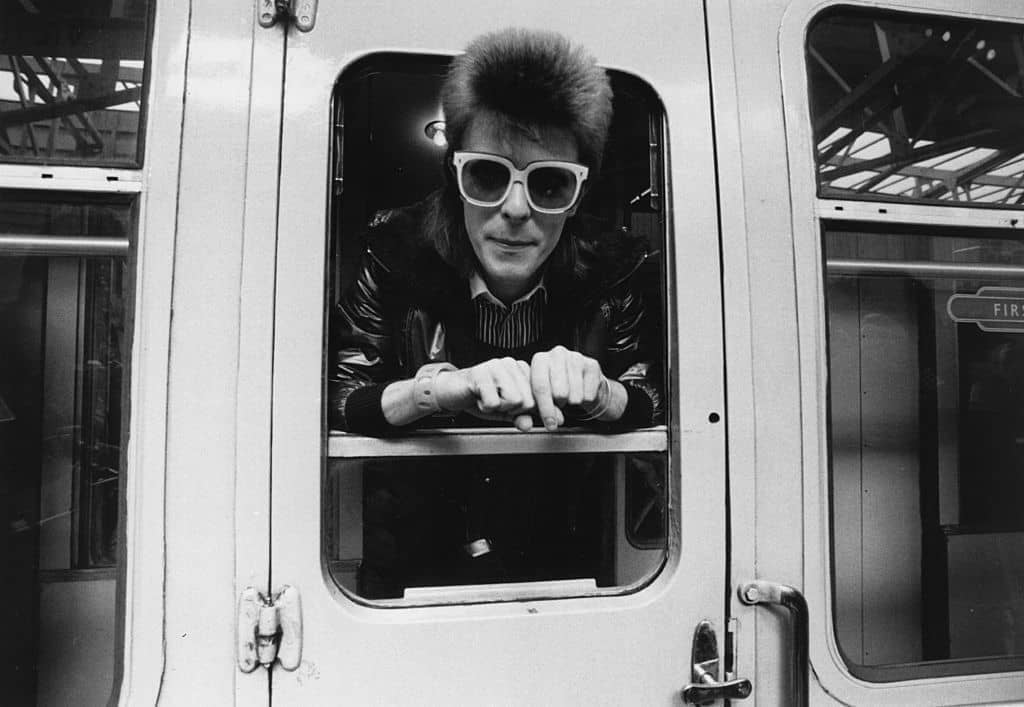Not long after being diagnosed with cancer, David Bowie reportedly made a secret trip to London to say his farewells. One of his stops was No. 4 Plaistow Grove, a modest terraced house in the heart of suburbia where he grew up, having moved there in 1955. I knew the house well. It was five minutes down the road from our home, which stood in a private lane alongside the golf course, in the village of Sundridge Park. Here, Davy lived with his mum Peggy and dad John.
Back in the early sixties, heady rock and rolls days even in Bromley, it was clear that Bowie – or Davy Jones, as he was then – was hell-bent on stardom. I saw Davy often on Bromley High Street; he was a well-known figure, hanging out outside the Wimpy Bar or one of the coffee bars where teenagers gathered, eschewing the upmarket Coffee Importers where mums met for cups of ground coffee after shopping at Marks and Spencers.
Jones’s mum was a regular visitor to my father’s theatrical agency, which stood one street over from Sundridge Park’s Plaistow Grove. In fact, she popped in so frequently that my mother suspected she and my father were having an affair.My dad, a handsome exuberant man, debonair and charming, played ukulele, banjo and double bass in his own very successful dance band, The Gay Knights. Mr Jones was interested in these instruments for his son. ‘Davy’s mad keen on music,’ he told my father.
It didn’t take long before Davy Jones’s career, at least on the local scene, was taking off. By 1962, he was playing with a group, The Konrads, formed that year. Davy’s mate, George Underwood, was a member of the band. They performed at youth gigs and weddings. Well before Bowie became internationally famous, he was being booked to play the top venues on the south London music scene, Chislehurst Caves and the Bromley Court Hotel.
I first crossed paths with him one Saturday lunchtime at the local train station
As for me, my childhood was somewhat less glamorous. As the Swinging Sixties took hold, I was fourteen and overweight; a complex-ridden convent girl desperate to escape my turbulent home life to become a famous actress.
Having admired Bowie at a distance, I first crossed paths with him one Saturday lunchtime at the local train station. On this particular Saturday, there was no one on the platform except Davy and myself. I noticed him swinging his arms about, moving his legs in big steps. He was dancing. He might have been singing too, but I was too far off to hear. I waited at my end of the platform where the front carriage of the train would arrive, throwing occasional glances towards the bopping figure who paid me no attention. The train pulled in. I opened the door to the first compartment and stepped aboard. Extraordinarily, unexpectedly, Davy hotfooted it, long legs bounding, from the far end of the platform to where I was settling, and dropped down opposite me.
The train set off. I stared out the window, nervous, shy.
‘I’m gonna write rock operas,’ was his opening gambit.
I longed to confide that I was headed for Hollywood or to be crowned a dame of classical theatre, but I was too tongue-tied. Without drawing breath, Davy painted dazzling pictures of his future. Arms animated, he was looking out the window, gazing into his own remarkable cinematic fantasies, occasionally glancing at me, one foot crossed over the opposite knee. In that south London accent of his, he spoke like a poet.
I suppose I eventually mumbled something. I must have because after that we took that train to London regularly, sitting together during these Saturday excursions. Always – I remember no other topics of conversation – he described a host of trajectories to superstardom.
A few years later Jones left Bromley but remained in the neighbourhood. He moved to Beckenham,becoming one of the founding members of a folk club that operated out of the Three Tuns pub; it’s now a branch of Zizzis.
In 1969, Davy’s dad died. His mother continued to visit my father in his shop, but Davy’s path and mine never crossed again.
When Bowie died, I grieved for weeks. It’s hard to believe that it’s been six years since he left us – or indeed fifty years this week since his album Ziggy Stardust first hit the shelves, catapulting him into another stratosphere.
I grieved Bowie’s death so deeply because it was as if all the unspoken dreams went with him, fragile youthful aspirations. Even when he was growing up in that tucked-away street in Sundridge Park, Davy was bold, daring. He visualised his future, many futures, and made them happen.
At my home in France in my writing room, in pride of place stand my late father’s banjo and ukelele. I picture Davy playing them, strumming chords of songs not yet written, running his fingers over the strings of the instruments in the days before he could afford his own.
Carol Drinkwater’s most recent novel, AN ACT OF LOVE, is published by Penguin £7.99






Comments